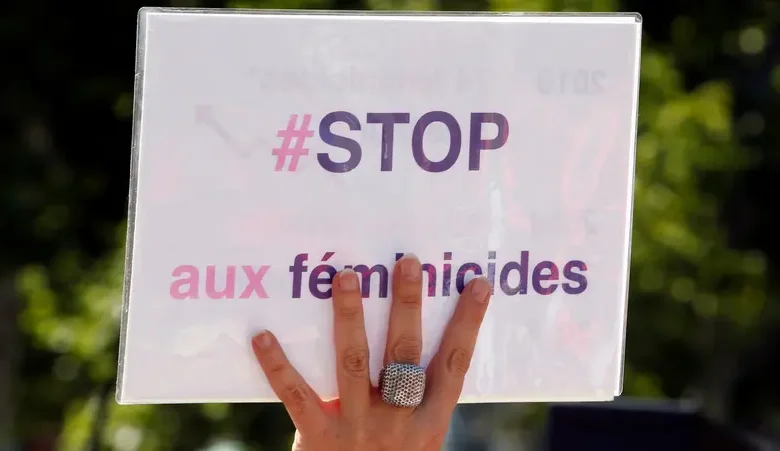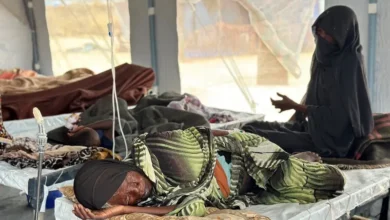Femicide in North Africa exposed but legal protection lags

Femicide and domestic violence against women in North Africa are increasingly reported online and by the media but rights groups say legal measures to protect the victims are still lacking.
In Algeria, at least one woman is killed each week, according to the watchdog Feminicides Algerie, which has been documenting murders since 2019.
Across the border in Tunisia, femicide rates quadrupled between 2018 and 2023, reaching 25 murders compared to six in 2018, according to the NGOs Aswat Nissa and Manara.
The situation is also alarming in Morocco where Stop Feminicides Maroc, another group, has recorded five killings so far this year, with at least 50 cases in 2023 and more than 30 the year before.
The latest gender-based killing in Algeria took place on Monday in the eastern city of Khenchela, where according to media reports a man aged 49 stabbed his 37-year-old wife several times before slitting her throat.
Imad, who asked to use a pseudonym, said how his 23-year-old sister was murdered by her husband last year.
A mother of three, she was preparing a meal for the Ramadan fast when she was killed.
“Her husband found her taking selfies with her cell phone while frying some borek (stuffed pastries). He got angry and poured oil on her face then slit her throat,” Imed said.
His brother-in-law was tried and sentenced to just 10 years in prison for his crime after his lawyer submitted medical records claiming he suffered from depression, he added.
‘Cultural obstacles’
Farida, a 45-year-old Algerian, who also asked to use a pseudonym out of fear of retribution from her ex-husband, told AFP she nearly died when he attempted to choke her with a rope.
“My married life was very unhappy, with beatings and death threats,” the journalist and mother of four said. “He once strangled me with a rope until I collapsed.”
They eventually divorced but the husband got custody of the children and threatened to harm them if she filed a complaint, she said.
Femicide “is not a new phenomenon,” Algerian sociologist Yamina Rahou told AFP. “But it has become more visible with social media.”
Rights groups have also been raising awareness of the killing of women by their husbands or other male relatives, but they argue that known cases only represent the tip of the iceberg.
Tunisia’s most recent known attempted murder took place at the end of June in the southern region of Gafsa where a husband is suspected of dousing his wife with gasoline and setting her on fire, according to judicial sources.
The woman survived but was hospitalized with critical injuries while her husband escaped.
In 2017, Tunisia adopted a law aimed at fighting gender-related violence but its implementation has been slow, according to Karima Brini, head of the Tunisian Women and Citizenship group.
“Cultural obstacles” are among the main stumbling blocks, said Brini, noting that Tunisian schoolbooks continue to describe women as people “whose place is in the kitchen” while men “watch TV.”
Brini and Algeria’s Rahou said such views must change.
“We must raise awareness among both sexes from a young age about equality, shared responsibility and mutual respect,” in particular through state-run media, said Rahou.
Relying on law and law enforcement was “not enough,” she said.
Insufficient deterrents
At least 13 death sentences have been handed down in Algeria since 2019 for perpetrators of femicide, but a moratorium on executions has meant the convicts were sentenced to life in jail.
Sexual harassment, verbal or psychological aggression, and violence against women are also punished by law in Algeria since 2015.
In Morocco, violence against women has been punishable by law since 2018, but rights groups say it has not changed the reality on the ground where women continue to be victimized.
Judges in Morocco “tend to think that (domestic) violence… is a private” matter and as a result, the sentences meted out do not provide a sufficient deterrent, said lawyer Ghislaine Mamouni.
Camelia Echchihab, founder of “Stop Feminicides Maroc,” said Moroccan laws are a “farce” when it comes to violence against women and urged “more concrete” legislation.
In 2023, the brutal murder of a woman who was cut into pieces and hidden in a refrigerator sparked outrage across Morocco.
“The case is symbolic because it shows that there must be a certain level of horror for journalists to write about it, when in truth all femicide is horrible,” said Echchihab.








